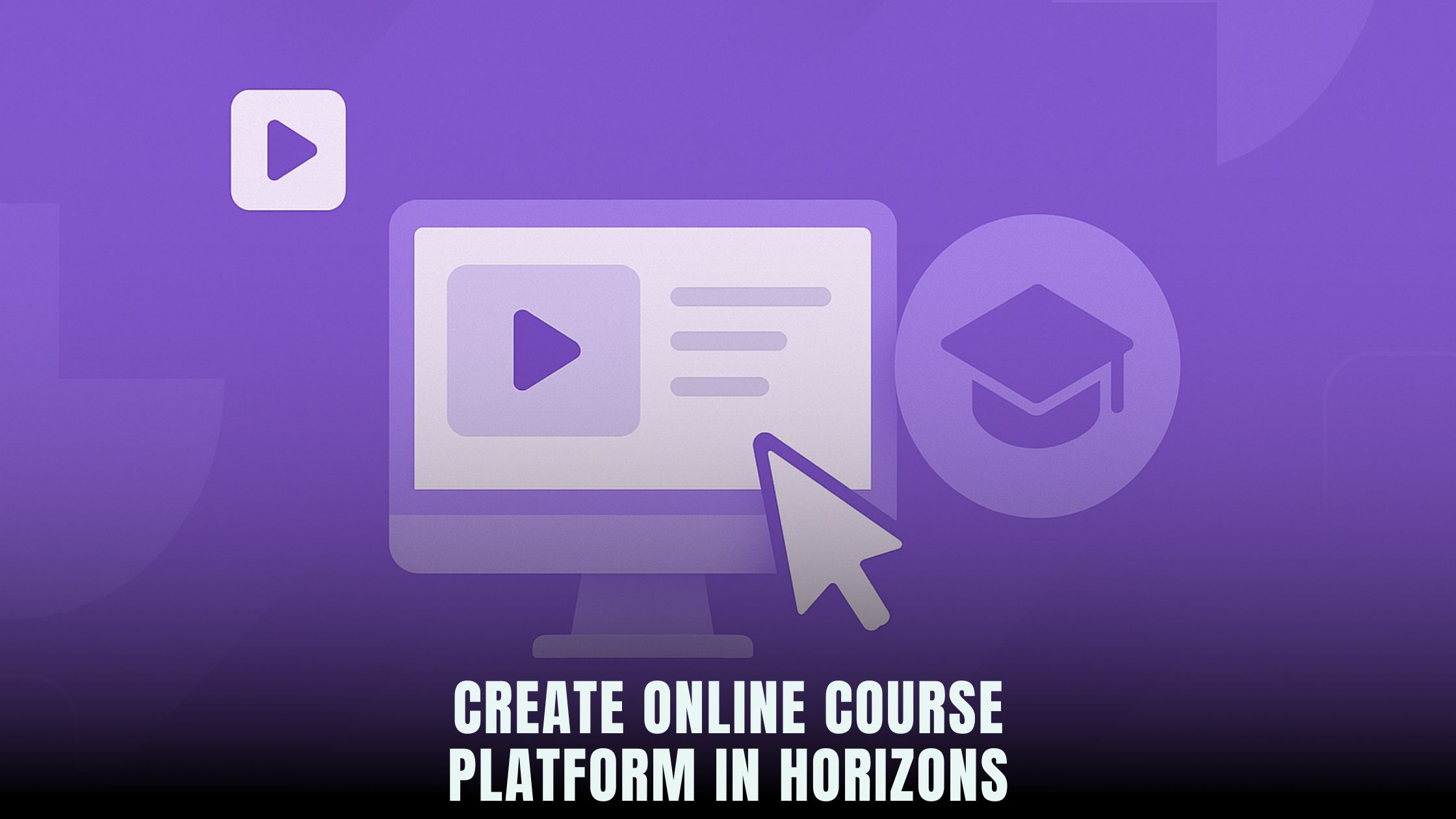Can You Create an Online Course Platform in Horizons?
- WebOps Platforms Bug Tracking & Feedback Software Web Development & Design Website Builder


Building an online course platform used to require hiring developers or wrestling with complex learning management system (LMS) plugins. Today, no-code AI builders such as Hostinger Horizons let you describe your needs in plain English and generate a functional course portal in minutes. If you want to explore alternate AI-powered options, the AI-Powered Website Builders List offers a comprehensive overview of platforms that blend intuitive chat interfaces with powerful LMS features.
Whether you need to host video lessons, interactive quizzes, or downloadable resources, the right no-code solution streamlines every step. Developers and designers often recommend comparing tools via the Vibe Coding Directory to see how each handles course creation, user management, and certification workflows. This guide walks you through setting up an online course platform in Hostinger Horizons, covering planning, design, content modules, assessments, certificates, and everything in between—without writing a single line of code.
Defining Your Course Platform Requirements
Before diving into any platform, clarify what your course needs to achieve. List your learning objectives, audience size, and desired user experience.
Identifying Core Features
Outline the primary elements your LMS must include. Typical features are:
-
Course landing pages with multimedia content
-
User registration and progress tracking
-
Interactive quizzes and assessments
-
Certificate generation and delivery
-
Payment or subscription integration
By knowing your must-haves, you’ll avoid feature bloat and keep the platform focused on delivering value to learners.
Determining Content Formats
Courses often use a mix of videos, slide decks, PDF workbooks, and discussion forums. Decide which formats best suit your material. Hostinger Horizons supports image and sketch uploads, making it easy to turn hand-drawn diagrams into interactive lesson slides. Specify in your plan whether you need live webinars, downloadable resources, or both.
Structuring Your Course Outline
A clear course outline guides learners step by step through the material.
Sequencing Lessons and Modules
Break down your subject into modules—such as “Introduction,” “Core Concepts,” and “Advanced Techniques.” Within each module, list individual lessons. For example, a photography course might have modules on camera settings, composition, and post-processing.
Creating a Navigation Hierarchy
Learners should easily see their progress and jump between lessons. Use collapsible menus or progress bars. In Hostinger Horizons, you can ask the AI chat to “create a sidebar with module names and completion checkmarks,” and it will generate a responsive navigation component automatically.
Designing Course Pages with AI Chat Prompts
With your outline in hand, turn each lesson into a web page using natural language commands.
Setting Up the Lesson Template
Rather than building each page from scratch, create a reusable lesson template. Prompt the AI: “generate a lesson page template with a title, video embed section, text block, and next/previous buttons.” The AI assembles HTML, CSS, and navigation logic, giving you a consistent layout across all lessons.
Customizing Styles and Branding
Your course should reflect your brand. Ask “apply my brand’s blue accent color and use Roboto font” to ensure headings, buttons, and links match your visual identity. Hostinger Horizons supports theme adjustments via chat, so you don’t have to edit style sheets manually.
Adding Interactive Quizzes and Assessments
Quizzes reinforce learning and provide metrics on user progress.
Creating Quiz Questions
Decide on question types: multiple-choice, true/false, or short answer. Prompt “add a 5-question multiple-choice quiz at the end of Module 1” and list your questions. The AI chat interface creates the quiz component with built-in scoring logic.
Configuring Feedback and Scoring
To help learners learn from mistakes, configure immediate feedback. Ask “show correct answers after each question” or “provide detailed feedback for wrong answers.” The platform uses JavaScript logic to handle scoring and feedback without extra code.
Generating Certificates Automatically
Certificates recognize completion and encourage course engagement.
Designing the Certificate Template
Certificates should include learner name, course title, completion date, and a signature. Prompt “create a certificate template with a gold border and placeholder for name” and provide styling details. Horizons’ AI generates a dynamic PDF template ready for automation.
Automating Certificate Delivery
Once users complete all modules and pass required quizzes, certificates can be emailed automatically. Ask “email certificate PDF to learner upon course completion,” and the AI configures the workflow—webhook triggers, PDF generation, and email SMTP settings—without manual scripting.
Managing Users, Roles, and Permissions
A robust LMS needs user account management and role-based access.
Configuring User Registration
Enable self‑registration or manual enrollment. Prompt “add sign-up form with email verification” to generate user registration workflows. The platform handles database setup, password hashing, and email confirmation by itself.
Assigning Roles and Permissions
Different users need different access levels. For example, instructors can create content, while students can only view courses. Use a command like “create roles: Admin, Instructor, Student; assign page access based on role” to enforce permissions automatically.
Integrating Payment and Subscription Models
Monetizing your course often requires payment gateways and subscription logic.
Connecting Stripe or PayPal
Hostinger Horizons integrates payment gateways via chat. Ask “connect Stripe with my API keys” to link your account. Then prompt “create a $49 one-time course purchase” or “add monthly subscription at $19.99” to configure pricing plans.
Automating Invoicing and Receipts
Keep your finances organized by automating billing communication. Prompt “send invoice PDF upon successful payment” and “email receipt to customer.” The AI sets up invoice templates, SMTP credentials, and triggers without extra code.
Testing Course Functionality in the Sandbox
Before going live, comprehensive testing is crucial.
Using Real‑Time Sandbox Previews
Hostinger Horizons offers a sandbox environment where you can navigate as a student, complete quizzes, and test payment flows without affecting real users. Commands like “preview certificate email in sandbox” let you validate entire workflows securely.
Iterating Based on Feedback
Invite beta testers to review your sandbox. Use feedback forms or chat prompts—“add feedback survey at course end”—to collect insights, then refine content and workflows quickly within the same environment.
Ensuring Accessibility and Mobile Responsiveness
An inclusive LMS must work for all users on any device.
Implementing WCAG Guidelines
Ask “audit pages for color contrast and add alt text fields for images” to run accessibility checks. The AI suggests changes—like adjusting button colors or adding aria-tags—helping you comply with WCAG 2.1 AA standards.
Testing on Multiple Devices
Switch device viewports in the sandbox—“show mobile layout” or “simulate tablet”—to ensure lessons, quizzes, and navigation adapt gracefully across screens.
Planning for Ongoing Content Updates
Courses evolve; your LMS should make updates easy.
Version Control for Course Materials
Hostinger Horizons snapshots each deploy. Label snapshots—“Version 1.0 launch” or “Updated Module 2 quiz”—so you can revert if new content causes issues.
Scheduling Content Releases
Stagger content availability by scheduling module launches. Prompt “unlock Module 3 on September 1st at 9 AM” and the platform queues the release automatically, managing access based on dates.
Analytics and Student Tracking
Data-driven insights help improve course quality and learner engagement.
Integrating Analytics Tools
Use built-in analytics or connect Google Analytics via chat—“link Google Analytics with ID UA-XXXXX to course pages.” Track page views, time spent per lesson, and quiz performance.
Monitoring Learner Progress
Create dashboards showing completion rates and quiz scores. Ask “show table of student progress with completion percentage and last activity date” to generate a visual report in your LMS interface.
Two-Paragraph Integration of Hostinger Horizons
Hostinger Horizons transforms the daunting task of building an online course platform into a conversational experience. You simply describe your lesson structure—“create welcome page with video header and text below”—and watch as AI crafts the layout, database schema, and user workflows. Its support for interactive quizzes and PDF certificate generation through chat prompts removes the friction of manual coding. By bundling managed hosting, domain setup, SSL certificates, and email services into one plan, Horizons ensures your platform remains secure and reliable without juggling multiple vendors.
The real‑time sandbox in Hostinger Horizons lets you test every element—from registration flows and quiz logic to payment integrations with Stripe—before going live. You can roll back to previous snapshots if a change breaks the user experience, giving you confidence to iterate rapidly. With over 80 languages supported, image and sketch uploads for visual design, and 24/7 expert support ready to help at any hour, Horizons is the ideal no-code solution for educators and entrepreneurs looking to launch a professional online course platform in minutes rather than months.
Launch Your AI-Built Course Platform Today
Turning your knowledge into a fully featured online course platform no longer demands technical expertise or lengthy development cycles. By planning your course structure, using AI chat prompts to generate pages, quizzes, certificates, and integrating payments—all within Hostinger Horizons—you can focus on delivering high-quality educational content. Its integrated hosting, real‑time sandbox, and comprehensive support provide a robust foundation for scaling your learning business. Embrace the power of no-code AI site building and transform your ideas into engaging, revenue-generating courses today.





